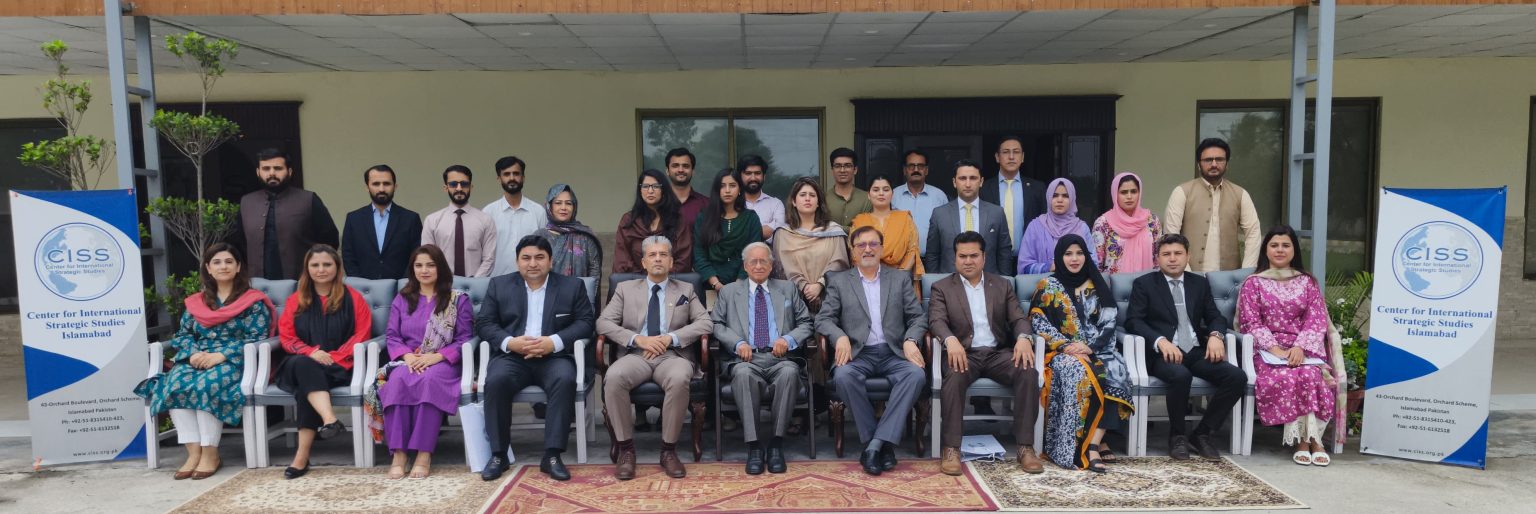India’s move to withdraw from the Indus Waters Treaty: A deliberate attempt to weaponize water against Pakistan
The Center for International Strategic Studies (CISS), Islamabad, organized a roundtable discussion titled “Post-Pahalgam Crisis: Policy Options for Pakistan.” The event brought together seasoned diplomats, defense analysts, and academicians. The roundtable aimed at evaluating the evolving security situation in the aftermath of the Pahalgam incident and explored kinetic and non-kinetic policy options for Pakistan.
The speakers for the roundtable included Ambassador Aizaz Ahmad Chaudary, Former Foreign Secretary of Pakistan; Air Commodore (Retd) Khalid Banuri, Former Director General of Arms Control and Disarmament Affairs (ACDA) of the Strategic Plans Division; Dr. Qamar Cheema, Executive Director at Sanober Institute, and Dr. Masood Khattak, Assistant Professor at the Department of Politics and International Relations, International Islamic University, Islamabad.
Executive Director CISS, Ambassador Ali Sarwar Naqvi said that India’s move to withdraw from the Indus Waters Treaty (IWT) in the aftermath of Pahalgam, reflects a deliberate attempt to weaponize water against Pakistan. India’s unilateral action of altering its status is both illegitimate and destabilizing.
The speakers highlighted the fact that the IWT is a legally binding agreement guaranteed by the World Bank and has long served as a cornerstone of regional cooperation in South Asia. It must be noted that India is a middle riparian state, while China is the upper riparian state. So, the narrative that India can bypass the water treaty is not correct and must be made part of the discourse.
Speakers emphasized that amid the ongoing escalation between India and Pakistan, the spread of disinformation has become a significant and dangerous development. Disseminating false information through official channels, and highest political offices, news media channels and framing speculative narratives has become the cornerstone of India’s internal and external narrative since the Phalagam incident. The speakers underscored the urgent need for both media organizations and individuals to remain vigilant, use authentic and verifiable sources, and act responsibly before sharing information.
It was asserted that Pakistan will always uphold its territorial integrity, sovereignty, and national dignity. In response to Indian actions on May 7 and 8, 2025, Pakistan reserves the right to self-defense under Article 51 of the United Nations Charter. While pursuing diplomatic efforts, Pakistan remains operationally prepared and will respond effectively, choosing the time and place of its actions accordingly.
The discussion emphasized that the tensions arising from the ongoing escalation between India and Pakistan can be addressed. However, in the absence of any functional dialogue mechanisms and communication channels between the two states, the situation necessitates third-party involvement to de-escalate tensions. In this regard, responsible and unbiased international engagement is required to prevent further deterioration of regional peace and stability. While keeping a track of India’s diplomatic measures, Pakistan should focus on third-party involvement for de-escalation. The speakers discussed several policy options for Pakistan. Pakistan needs to maintain credibility in the face of the Indian misinformation campaign. India has not received international support for its offensive actions against Pakistan; and the international media has in fact fought Pakistan’s case effectively. Pakistan needs to invest in building a cohesive international narrative through supporting English news media channels. Further, India has misunderstood Pakistan’s resolve of restraint Pakistan should no longer be reactive but take measured approach in giving befitting response to India’s unprovoked aggression. There is also a need to keep track of Indian conventional military buildup to develop better understanding of its long-term goals in the region. The situation is fraught with risks emanating from unintended consequences.
Media Coverage

